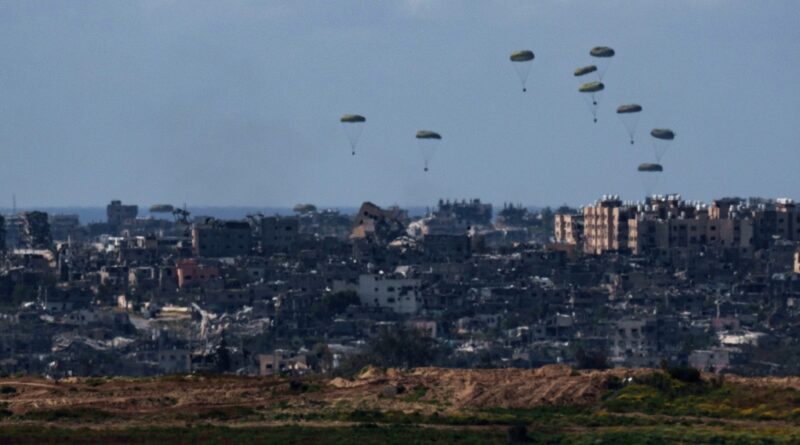Aerial Aid Drops Spark Criticism Amidst Gaza Famine Crisis
Last Sunday, aid supplies were dispatched into Gaza through aerial dropping. This method, however, received criticism from the United Nations who deemed it as a misleading and ineffective technique, alleging it could cause harm to already starving inhabitants. Scheduled deliveries of aid in particular regions of the territory were suspended for a while to ensure more supplies could reach those in need. Whether or not this strategy would mitigate the prevailing famine crisis is yet to be seen, given the persistently increasing rates of starvation-related deaths.
Again, this past weekend saw additional help being delivered via parachutes into Gaza. The aid-drop procedure has been under scrutiny from the UN, arguing it distracts from the real issues and is generally inefficient. They have raised concerns about the well-being of famine-struck civilians, who could potentially be put in harm’s way due to these operations.
A pause in military activities in certain sections of the Israel-controlled area was initiated on Sunday, as a measure to facilitate the inflow of international aid. This step was taken amid mounting global indignation about the acute food shortage tormenting the Palestinians living in the region.
Israel’s decision to halt military actions can be seen as a policy turnaround, which came as a result of intensifying pressures over the dismal Gaza situation. It’s reported that almost one-third of the population in this area hadn’t been able to eat for several consecutive days, a heartbreaking fact relayed by the World Food Program, a body of the United Nations.
Several nations, comprising some traditionally friendly to Israel, hold it accountable for the rampant food crisis in Gaza. Between March and May, the Israeli administration instituted a blockade on almost all aid to Gaza as a course of pressuring Hamas to concede to their terms. Since then, the entry of aid to this enclave has been considerably restricted.
According to an announcement by the Israeli military, part of the policy amendment that came into effect this past Sunday would call for a daily halting of military operations in at least three Gaza regions from 10 a.m. to 8 p.m. This cessation of military activity would make possible the delivery of aid.
Furthermore, they noted that they would put forward specific secure pathways for U.N. aid convoys to safely deliver supplies during designated hours. Yet, it remained uncertain whether such changes would indeed facilitate sufficient nourishment to reach the needy population of Gaza.
Israel had issued similar announcements in the past regarding temporary cessation of military activities, the outcomes of which had been inconsistent. Aid agencies have contended that only a long-lasting truce will enable them to address the humanitarian crisis effectively.
Images show Palestinians shouldering sacks of flour in the wake of aid-laden trucks’ entry into northern Gaza last Sunday. The provisions brought a sense of hope to the locals, although the optimal scenario would involve a steadier, more reliable flow of aid.
Aid organizations expressed relief at the prospect of introducing food into Gaza without the looming fear of bombardment. However, they are simultaneously urging Israel to remove the hurdles hindering the overland transport of aid supplies into the region
While the airborne delivery of aid offers a brief respite for the territory’s beleaguered inhabitants, a sustainable solution to alleviate their hardships is required. Notwithstanding the criticism of international agencies, the Israeli government yet seems to be taking baby steps in response to the humanitarian crisis.
The support, although welcomed, is only a drop in the ocean given the broad scale of the crisis. The ripple effects of the blockade and sporadic aid delivery are yet to be mitigated, reflecting the harsh reality that the Gaza strip continues to grapple with.
Against all odds, however, the people of Gaza strive for survival, pinning their hopes on these irregular aid deliveries. These precarious occupants of the territory await solutions that transcend beyond providing momentary relief, solutions that truly resolve the underlying cause of their suffering.
Unraveling the complexity surrounding the Gaza predicament, the—often politicized—fuel to the persistent crisis calls for international focus and multilateral negotiations. Only through these united efforts and a sincere commitment to peace can we hope to uplift the hungry and the helpless in Gaza, and arguably, the world over.

